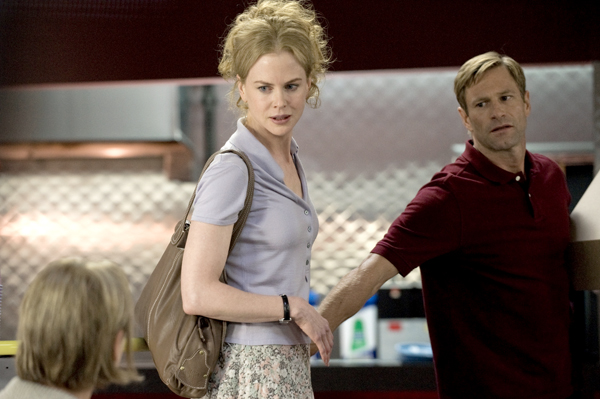|
Reviews of Recent Independent, Foreign, & Documentary Films in Theaters and DVD/Home Video

RABBIT HOLE John Cameron Mitchell’s film version of David Lindsay-Abaire’s overrated Pulitzer Prize-winning play consists of a series of scenes almost exclusively trained on a single target, like dumb bombs exploding after making their lone objectives. Rabbit Hole, about an upper-middle-class couple coping with the accidental death of their four-year-old son, is shallower than its title suggests. Becca, the bereaved heroine wallowing in her young son’s death, has to deal with her irresponsible younger sister’s pregnancy (how dare she bring a life into the world when Becca’s son lost his?); her mother’s constant mentioning of the drug overdose death of her 30-year-old son (and Becca’s brother); her husband Howie’s well-meaning but ineffectual attempts to rekindle their intimacy; and her own interest in Jason, the high school senior who was behind the wheel when her son ran out into the street. Becca’s unlikely relationship with Howie plays as an idealized form of forgiveness by Becca, who, despite sundry problems with everyone else in her life, makes an effort to bond with the young man who killed her son. Meanwhile she ridicules a couple’s reference to God and angels at a group therapy session and later slaps a woman shopping in a supermarket over an incident with a whiny toddler. The problem is not that such a tentative friendship wouldn’t blossom between these two people, but rather that Lindsay-Abaire and Mitchell never make it plausible, keeping it mainly symbolic, which puts it at arm’s-length from the viewer. (The comic book Jason creates clumsily explains the film’s title.) Lindsay-Abaire adds characters only mentioned in his play with platitudinous results. Gaby, the married woman from therapy whom Howie might be seeing, is only mentioned in the play. In the film, we see them grow closer to each other, even sharing some pot before a group meeting. Then in the movie’s phoniest scene, the two of them giggle their way through a session as others tell their emotional stories. Aside from that glaring misstep, this subplot about Howie’s relationship with Gaby, brought on by his frustration over his non-existent physical relationship with Becca, contains the movie’s most persuasive moments. Becca’s supermarket “fight,” paralleling an earlier scene when sister Izzy (one letter short of “Dizzy,” one assumes) is bailed out by Becca after getting into a bar fight, is only mentioned in the play, and the more effective for it. But acted out, the scene loses any emotional power it could have had because Becca comes off as unhinged rather than sympathetic. Mitchell directs with a subdued sledgehammer, using soft lighting from a Lifetime Channel tearjerker or an episode of Army Wives and even employing slow motion as Jason, on his way to the prom, sees Becca crying in her parked car after she has a flashback to the actual accident. It also doesn’t help that Anton Sanko’s music, mainly comprising piano tinkling, is used for maximum sentimental effect. The
performances range widely from Nicole Kidman’s often somnambulant Becca
to Aaron Eckhart’s intense Howie. The supporting characters—Dianne
Wiest’s Nat, Tammy Blanchard’s Izzy, Miles Teller’s Jason and Sandra
Oh’s Gaby—are given little opportunity to become three-dimensional,
since they serve as way stations in a flimsy psychological study.
Rabbit Hole takes a foolproof dramatic subject and makes it maudlin
rather than memorable.
Kevin Filipski
|

